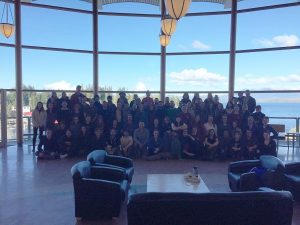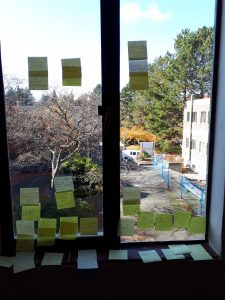Like a Conference, but Better
Today in EdTech we practiced a ‘mini-EdCamp’ design. EdCamp is a design for a casual conference that has a bottom-up or ‘un-conference‘ design. I have participated in a few un-conference events before, as they’re very trendy now, especially in education. However, I’ve never participated in an ‘EdCamp-brand’ conference. I look forward to participating in them once I’m working in a district. If the district doesn’t typically run an EdCamp, I’ll be organizing one early in my career.
Side Story

PEEC 2019 Participants. Photo by pacific_eec on Instagram. Used with permission.
Little known fact about me: running peer conferences is something I both love to do and have a ton of experience with. Have you heard of the Pacific Ecology and Evolution Conference (PEEC)? I was the lead organizer last year (no big deal). While it gets restructured every year, and the topics are influenced by the papers that participants submit, it’s a really inclusive research conference and not as amenable to bottom-up control, as we’d hate to exclude presenters because their field was not ‘voted up’.
I also attended Science Talk ’19 this past year, which was built on a digital un-conference model. Several months before the physical conference in Portland, OR, the organizers sent out calls to the sci-comm community to send in topics they are interested in, and they collate them into discussions and workshops, as well as bringing in speakers and panelists to speak to the ‘hot topics’. There are still keynotes and presenters, but it’s a much more organic, participant-controlled feeling. I’ve been to a lot of science conferences, but meeting some classroom teachers at this science communication conference was what gave me the final push into becoming a K-12 educator. This year’s conference interferes with the PDP program, but I cannot wait to go back and represent K-12 educators once I’m working in a district!
Back to Our Mini-EdCamp

Low-tech survey methods to choose our sessions. My photo.
We did a one-session version of the EdCamp model, which is done in a single day with sticky notes and not topics submitted ahead of time. In this model, there are no speakers brought in, and no presenters – just groups of peers discussing topics that they care about, and generating good ideas. The topic I chose to participate in was ‘Mindfulness Practice in the Classroom’. It turns out that we had a lot of expertise in the room, and we were able to better define ‘mindfulness’ as well as separate the benefits (and possible drawbacks) from the buzzword that it has become. We even talked about some best practices for using mindfulness in the classroom, including student buy-in and authenticity. A couple of us fell into the role of facilitators, and I think we all got something valuable from the discussion. It was also nice to have somewhat-unstructured time to talk frankly and casually with my fellow teacher candidates, which is another benefit of unconferences – the ability to make genuine connections with colleagues or speak with your coworkers outside of ‘work time’. That social aspect is crucial in a workplace, and I like that unconferences are free and not held during working hours – you’re off the clock!

Leave a Reply